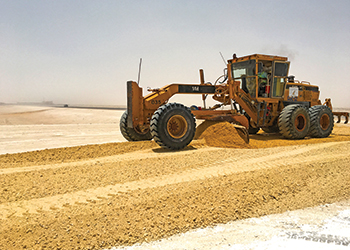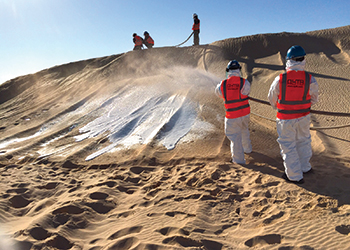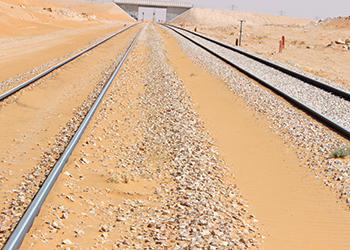 TerraFirma ... polymers offer several benefits when used in road construction.
TerraFirma ... polymers offer several benefits when used in road construction.
Traditional methods of preventing sand migration on roads and other critical infrastructure in the region could be a thing of the past if a Bahrain-based company’s claims that its polymer products can save GCC countries significant money gain traction.
TerraFirma - Desert Solutions says its eco-friendly polymers can effectively combat sand migration, erosion and ‘dune creep’ - problems prevalent in the region with the potential to disrupt and degrade transport networks and critical infrastructure, escalate maintenance costs, and even put lives at risk.
The company says its locally made polymers provide a flexible, durable ‘skin’ when applied to soil and sand surfaces and its proprietary blend of high-performance polymers and additives are designed to bind soil and sand particles into a cohesive matrix. Furthermore, the polymers can enhance the performance and durability of in-situ construction materials.
The company specialises in two areas –protection against blowing sand for pipelines, railways, roads and industrial installations and making roads and car-parks using polymers. Both processes start with a desert survey to assess soil granulometry, wind strength, direction and topography. This determines the design, polymer strength required and the overall required solution, and is done section by section throughout the project.
 |
|
TerraFirma undertaking sand stabilisation work in Ain Dar. |
Ray Calladine, general manager, TerraFirma - Desert Solutions, explains that in sand stabilisation, polymers are applied topically to loose or compacted sand formed into a TF-designed berm built on the windward side to create a hard, wind-resistant ‘crust. Travelling sand hits the berm and drops, thus sparing the installation. Oil giant Saudi Aramco has already adopted this technology for its environmental credentials to stabilise its pipeline berms and is rolling out more of this type of technology in the coming year.
For road construction, polymers are infused into the top 10 to 15 cm of wear course during the construction process, and compacted before the area is treated with a polymer seal coat.
“The benefits of this include reduced fines migration from base, sub-base and wear course; less rutting, spalling, and surface degradation; reduced infiltration, improved run-off and erosion control; and increased load-bearing capacity,” Calladine explains.
“We’re also providing answers to problems of road subsidence and trench reinstatement which traditional asphalt does not solve,” he adds.
 |
|
Polymers can keep high-speed railway tracks in the region protected from sand ingress. |
The company has already completed a road protection project for the Ministry of Transportation at Haradh, Saudi Arabia. “We offered a more environmentally sustainable alternative to the traditional and now obsolete practice of using crude oil or perpetual road cleaning,” Calladine says.
He adds that he is encouraged by the “almost limitless” potential of polymers in protecting critical infrastructure and saving costs on projects as diverse as railways, land reclamation schemes, real estate projects and industrial developments across the GCC. As such, TerraFirma is developing a ‘family’ of polymers for niche applications.
“Our polymers can strengthen in-situ material such as dredged silt used in land reclamation. There are also clear environmental benefits to using polymers. Plants, animals and ground water are no longer in jeopardy,” he stresses.
Nigel Parkes, TerraFirma’s founder and CEO, believes high-speed rail networks in the GCC, where the frequent clearing of sand from tracks in remote locations to prevent serious accidents presents major challenges for maintenance teams, is an area of significant potential. “We have conducted trials with the major rail networks in this regard which proves that our technology works,” says Parkes. “Quite why it has taken so long for our technology to be available in the market is a mystery. It’s not just about supplying chemicals but the whole package from specialist survey to application to back up - all key factors. TerraFirma, based in Bahrain, is the region’s only company to offer this all-encompassing technology.”
“Our polymer is produced in the GCC, avoiding long lead times and shipping delays often associated with imports,” he concludes.








.jpg)




.jpg)




























.jpg)
































